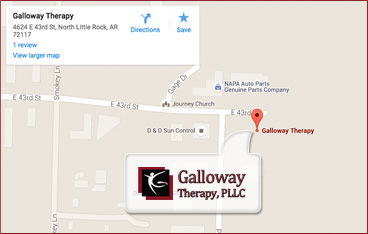Galloway Therapy FAQs answers some of the most common questions we are asked. However, don’t hesitate to contact us if you don’t find your answer below.
Q : Do I need a prescription/referral from a doctor to see a physical therapist?
A : Arkansas is a Direct Access state. This means that, no, you don’t have to have a prescription/referral from a doctor to see a physical therapist. However, most insurances will not pay for physical therapy services unless you have one.
Q : My doctor told me that I have to go to their own, in-house therapy, but I would rather go to another physical therapy clinic. What should I do?
A : Many doctors have their own therapy clinics and encourage their patients to attend them. However, a patient has the right to choose any clinic they prefer.
Q : What should I wear on my first visit?
A : Keep in mind the area needing treatment. If you are going to be seen for neck pain, then a turtleneck sweater probably isn’t the most appropriate attire. Loose, comfortable clothing is generally a good option. However, feel free to bring shorts to change in to. We will provide a gown if that is your preference.
Q : Will physical therapy hurt?
A : Physical Therapy treatment isn’t a cookie cutter pattern. Each patient has to be evaluated and treated specifically for their own condition. Pain is often a symptom of the condition for which patients seek treatment. In most cases, treatment is designed to help reduce pain, not increase it. This is done with honest communication between the patient and therapist. However, there are some conditions, specifically some post-surgical cases, that require a commitment from the patient in order for the goals set forth during the initial evaluation to be met. If pain is increased during exercise, all efforts are made to help alleviate it afterwards with a variety of modalities. Again, honest, open communication between the patient and therapist is always encouraged and beneficial.
Q : How long will I have to go to therapy, and how long is each session?
A : Treatment duration varies upon the condition. The length of each session usually will last anywhere from 45-90 minutes depending on the specific treatment. This is usually discussed during the initial visit and agreed upon with regard given to the patient’s needs.

